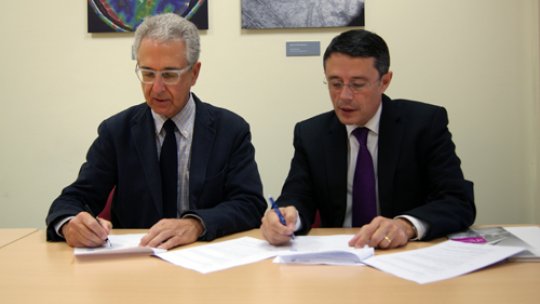Images
Contact

The agreement will boost synergies between the 86 groups that comprise these two biomedical research centres.
The Institute for Research in Biomedicine (IRB Barcelona) and the Vall d'Hebron Research Institute (VHIR) have signed a collaboration agreement for the development and implementation of projects in oriented basic research and translational investigation, as well as the subsequent commercial exploitation of the results that may be generated. This three-year extendable contract has been signed today by IRB director Dr. Joan J. Guinovart and VHIR director Dr. Joan X. Comella.
The joint project will involve establishing collaboration strategies for specific areas of interest for the groups working at these two biomedical research centres of excellence, both recognised by the CERCA Institution. The final goal of this alliance is to translate knowledge and breakthroughs produced in the lab to the patient, especially by promoting the commercialization of the results generated by this collaboration agreement.
The agreement also envisages the development of a plan for the clinical evaluation and assessment of projects that come about at IRB, a shared training programme, and the organisation of scientific sessions and exchanges. In addition, the two centres will follow the recommendations of the new EU Framework Programme for Research and innovation Horizon2020, as the agreement contemplates the presentation of joint applications for European projects.
For the director of VHIR, Dr. Joan X. Comella, these kinds of alliance “are initiatives that the national biomedical sector seeks to promote in order to tackle current and future challenges, as they are essential for the development of a new model of sustainability and scientific collaboration that generates wealth, innovation and applied answers to the health challenges faced by society.”
The director of IRB, Dr. Joan J. Guinovart, states that “this is the direction we have to take in order to make research performed in Catalonia, and especially biomedical research in Barcelona, an international reference. Partnerships between basic research institutes and hospital research centres are crucial to boost the area of Barcelona as a biomedical hub. Together we will be stronger and more competitive”.
Three examples of IRB-VHIR collaboration
One of the collaboration projects currently underway—which has been running for 6 months—is headed by Dr. Salvador Aznar Benitah, ICREA researcher and head of the Stem Cell and Cancer Group at IRB. This line of research seeks to identify and characterize the cells that trigger metastasis in squamous cells of oral cancer. The research, which has been funded by the last campaign of the “La Marató de TV3”, will be done over three years using tumour samples from patients treated in the “Hospital Universitari Vall d’Hebron” and in collaboration with the Biobank of this same hospital.
Furthermore, the Metabolic Engineering and Diabetes Group, headed by Dr. Guinovart at IRB Barcelona, collaborates in two projects undertaken by VHIR. The first, a study coordinated by Dr. Tomàs Pinós, researcher with the Neuromuscular and Mitochondrial Pathology Group, seeks to enhance the muscular phenotype of mice with McArdle disease, a glycogen storage disease. The VHIR provides this group of mice and the knowledge on the pathology, while IRB Barcelona contributes glycogen synthase-deficient mice and the expertise on its related diseases. The second project, led by Dr. Rafael Simó, head of the Diabetes and Metabolism Group at VHIR, has, for the last two years, studied the mechanisms that cause diabetic retinopathy, especially the role of glycogen accumulation.
Institute for Research in Biomedicine (IRB Barcelona)
Founded in 2005 by the “Generalitat de Catalunya” and the University of Barcelona, the Institute for Research in Biomedicine (IRB) is a “Severo Ochoa Centre of Excellence”, an accolade given in 2011 in the first announcement of this an award. The 23 research groups—12 headed by ICREA research professors—are devoted to basic and applied investigation at the interface between molecular and cell biology, structural and computational biology, and chemistry, with experts in proteomics, genomics, biostatistics, bioinformatics and advanced digital microscopy. The research is organized into five programmes, with the objective to undertake multidisciplinary projects capable of tackling biomedical problems of great socioeconomic impact, with a special emphasis on cancer and metastasis. IRB Barcelona hosts 430 people with 38 nationalities. The final strategic mission is to translate the results generated to clinical practice, and since its set-up it has established three biotech enterprises. It is located in the Barcelona Science Park, on the Diagonal Campus of the University of Barcelona. Director: Joan J. Guinovart. www.irbbarcelona.org /@IRBBarcelona / www.facebook.com/irbbarcelona
Vall d’Hebron Institut de Recerca (VHIR)
Vall d'Hebron Research Institute (VHIR) is a public sector institution that promotes and develops innovative biomedical research at the University Hospital Vall d'Hebron. VHIR is oriented towards finding solutions to the health problems of the citizens and has the will to contribute to the scientific, educational, social and economic development within its area of competence. With 63 research groups in the main medical areas, VHIR aspires to be one of the main actors to help define and consolidate the space of biomedical research in southern Europe; working both in basic and translational or applied research. It has the challenge to promote and resolutely support clinical research. www.vhir.org /@VHIR_ / www.facebook.com/vhir.org
About IRB Barcelona
The Institute for Research in Biomedicine (IRB Barcelona) pursues a society free of disease. To this end, it conducts multidisciplinary research of excellence to cure cancer and other diseases linked to ageing. It establishes technology transfer agreements with the pharmaceutical industry and major hospitals to bring research results closer to society, and organises a range of science outreach activities to engage the public in an open dialogue. IRB Barcelona is an international centre that hosts 400 researchers and more than 30 nationalities. Recognised as a Severo Ochoa Centre of Excellence since 2011, IRB Barcelona is a CERCA centre and member of the Barcelona Institute of Science and Technology (BIST).




